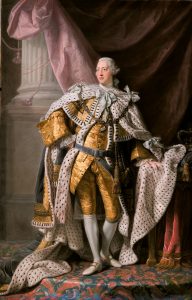Ch. 4.1. British Monarchy in the Eighteenth Century: The Hanoverians
A Weakened but Enduring Monarchy: Already in 1689 the Glorious Revolution had made clear that in many respects, such as in the crucial functions of taxation and legislation, the English King was subordinate to Parliament. Nonetheless, it took time for this new balance of power to become fully established in practice. Even over the early 1700s, as Parliament was acquiring almost full power within the British government, its power was partially hidden from view, at least to later observers, because the broader political culture of the time still accorded great respect to the king. Thus the king remained the focus of personal loyalty and of national patriotism. People still considered themselves the king’s subjects. Similarly, institutions associated with national pride were (and are) still called ‘royal,’ such as the Royal Navy or the Royal Society (Britain’s premier scientific organization).
The Hanoverian Dynasty, 1714-1901.
George I (1714-27). Queen Anne, the last Stuart monarch, died in 1714 without any children. Parliament then chose as her successor George Louis, the 54-year-old Prince-Elector of the German principality of Hanover, because, though just a distant cousin, he was Anne’s closest Protestant relative. As George I of Great Britain, he ruled until his death in 1727. Although he played a role in shaping Britain’s foreign policy and had some influence in domestic politics, at first his command of English was weak, and his ability to lead Britain politically was limited. Instead, he ruled primarily through Parliament, guided especially by Robert Walpole (see below, under Prime Minister).
George II (1727-60). George II succeeded his father as King of Britain. Like his father, George II had been born and raised in Germany, where he had lived until he was 31. This and the fact that the monarch’s power was declining as Parliament became more important meant that, like his father, he played only a secondary role in shaping policy.
George III (1760-1820). George III became king on the death of his grandfather George II (his father had died earlier, never becoming king), and he began his rule at the young age of 22.

The first of the Hanoverian line to be born in England and to speak English as his native tongue, George III began his reign with ambitions of being a more active leader than his German-born predecessors. Although he succeeded in exerting some influence on the choice of leading ministers, including occasionally the Prime Minister, in general he had to accept that Parliament now governed Britain in virtually all respects. When Americans began to rebel against British rule, George III agreed with the majority of Parliament that the rebellion should be suppressed and that Britain should fight to retain its American colonies. From 1788 he began to suffer intermittent bouts of a debilitating but still undiagnosed mental illness, an illness that left him incapacitated for most of the last ten years of his long reign.
